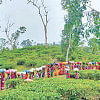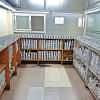Tea growers saw bumper yields in 2023

Tea production in Bangladesh may have reached a historic high in 2023 as growers secured bumper yields in the first 11 months of the year, according to industry people.
As per data of the Bangladesh Tea Board, the 168 tea gardens across the country had suffered a slow start to the season in face of insufficient rainfall.
But the favourable weather that soon followed helped them secure bumper yields of 95.34 million kilogrammes (kgs), exceeding the previous year's overall production by 10.79 percent.
Major General Md Ashraul Islam, chairman of the Bangladesh Tea Board, hopes tea production may now exceed the annual target of 102 million kgs if December's figures are included.
However, this is the first time tea production in the country could exceed 100 million kgs in a single year.
Islam said proper planning and implementation on their part are to thank for the rise in tea production.
For example, the tea board previously made it mandatory for all conventional tea gardens to widen their production area by 2.7 percent annually while failure to do so would result in penalties.
Besides, training on modern production methods are regularly arranged for tea growers with technical assistance from global firms, such as the London Tea Exchange, he added.
Islam also informed that huge volumes of tea are currently being grown by small-scale farmers in the country's northern region, thereby boosting overall production.
On the other hand, tea growers have no reason to cheer for higher production as prices remain sub-par.
Kamran Tanvirur Rahman, chairman of the Bangladesh Tea Association, said favourable weather and the establishment of many new tea plantations over the past few years has helped increase production.
But while gardens in the northern region are producing big quantities, the quality of their tea is far lower than that grown by conventional gardens in Sylhet and Chattogram.
"This is leading to oversupply, which is downgrading the overall market," he added.
He also expressed frustration over the steep fall in the sale and prices of tea at weekly auctions last year.
"The sector was dealt a heavy blow by poor prices and sales while production costs rose," Rahman said.
"If sales and prices do not improve, many gardens will shut down due to losses," he added.

 For all latest news, follow The Daily Star's Google News channel.
For all latest news, follow The Daily Star's Google News channel. 








Comments